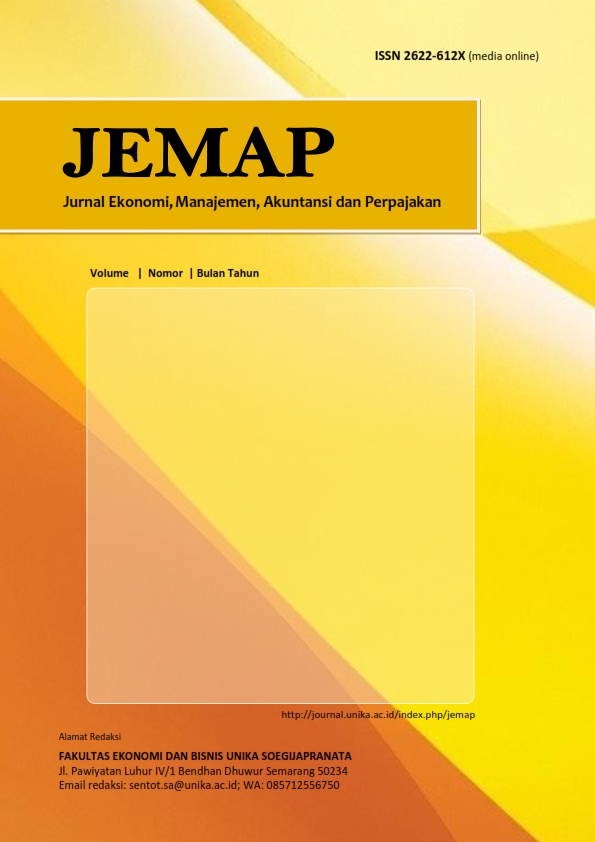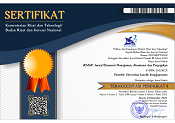Apakah Interaksi Otoritas Pajak Dengan Wajib Pajak Meningkatkan Kepatuhan?
Abstract
The interaction between the Tax Authorities and Taxpayers through written communications with enforcement letters, soft letters and direct communications through visits was expected to increase tax compliance. This study aims to determine the effect of the interaction between the tax authorities and taxpayers on taxpayer compliance. The analysis of this research used non-employee individual taxpayers registered as taxpayers at KPP Pratama Klaten. Data were analyzed using probit regression. The results of this study indicated that the interaction with a soft letter (SP2DK) and an enforcement letter had a significant negative effect on compliance, while the interaction with visits had a significant positive effect on formal compliance. Based on the results of this study, it is hoped that the Tax Authorities in Indonesia will consider to make more effective policies and strategies related to interactions with taxpayers.
Keywords
Full Text:
PDF (Bahasa Indonesia)References
Adiatma, A. E. (2016). Pengaruh Edukasi, Sosialisasi, dan Himbauan terhadap Kepatuhan Wajib Pajak dalam Melaporkan Spt Tahunan Pajak Penghasilan (Studi pada Wajib Pajak Orang Pribadi yang Terdaftar di Kantor Pelayanan Pajak Pratama Malang Utara). Jurnal Mahasiswa Perpajakan, 8(1).
Allingham, M. G., & Sandmo, A. (1972). Income tax evasion: A theoretical analysis. Journal of public economics, 1(3-4), 323-338.
Alm, J. (1991). A perspective on the experimental analysis of taxpayer reporting. The Accounting Review, 66(3), 577-593.
Alm, J. (2019). What motivates tax compliance? Journal of Economic Surveys, 33(2), 353-388.
Alm, J., Sanchez, I., & De Juan, A. (1995). Economic and noneconomic factors in tax compliance. Kyklos, 48(1), 1-18.
Andreoni, J., Erard, B., & Feinstein, J. (1998). Tax compliance. Journal of economic literature, 36(2), 818-860.
Assumptions of Logistic Regression. (n.d.). Assumptions of Logistic Regression. Statistics Solutions. https://www.statisticssolutions.com/assumptions-of-logistic-regression/
Becker, G. S. (1968). Crime and punishment: An economic approach The economic dimensions of crime (pp. 13-68): Springer.
Bhargava, S., & Manoli, D. (2015). Psychological frictions and the incomplete take-up of social benefits: Evidence from an IRS field experiment. American Economic Review, 105(11), 3489-3529.
Bird, R. M. (2015). Improving tax administration in developing countries. Journal of Tax Administration, 1(1), 23-45.
Boning, W. C., Guyton, J., Hodge, R. H., Slemrod, J., & Troiano, U. (2018). Heard it through the grapevine: direct and network effects of a tax enforcement field experiment. Retrieved from
Brehm, S. S., & Brehm, J. W. (2013). Psychological reactance: A theory of freedom and control: Academic Press.
Brotodihardjo, S. (1998). Pengantar Ilmu Hukum Pajak, PT. Refika Aditama, Bandung.
Devos, K. (2013). Factors influencing individual taxpayer compliance behaviour: Springer Science & Business Media.
Dinku, T., & Alamirew, A. (2018). External Factors Affecting Voluntary Taxpayers Compliance: The Case of Amhara National Regional State Revenue Authorities. International Journal of Public Administration.
DJP. (2015). Ditjen Pajak Ajak 10.900 Pengguna Faktur Pajak Fiktif Manfaatkan Tahun Pembinaan Wajib Pajak 2015. DJP. https://www.pajak.go.id/sites/default/files/d7/Siaran%20Pers%20Ditjen%20Pajak%20Ajak%2010.900%20Pengguna%20Faktur%20Pajak%20Fiktif%20Manfaatkan%20TPWP%202015.pdf
DJP. (2018). Laporan Kinerja Direktorat Jenderal Pajak Tahun 2017. DJP. https://www.pajak.go.id/sites/default/files/2019-03/LAKIN%20DJP%202017.pdf
DJP. (2019). Laporan Kinerja Direktorat Jenderal Pajak Tahun 2018. DJP. https://pajak.go.id/sites/default/files/2019-05/LAKIN%20DJP%202018.pdf
DJP. (2020). Laporan Kinerja Direktorat Jenderal Pajak Tahun 2019. DJP. https://www.pajak.go.id/sites/default/files/2020-02/LAKIN%20DJP%202019.pdf
DJP. (n.d.). DJP Ingin Wajib Pajak Tidak Perlu Datang ke KPP. Diakses Tanggal 31 Januari 2020, dari https://www.pajak.go.id/id/berita/djp-ingin-wajib-pajak-tidak-perlu-datang-ke-kpp.
Drago, F., Mengel, F., & Traxler, C. (2015). Compliance behavior in networks: Evidence from a field experiment.
Dubin, J. A., Graetz, M. J., & Wilde, L. L. (1987). Are we a nation of tax cheaters? New econometric evidence on tax compliance. The American Economic Review, 77(2), 240-245.
Effendy, O. U. (2009). Ilmu Komunikasi Teori dan Praktek. PT. Remaja Rosdakarya.
Guyton, J., Manoli, D. S., Schafer, B., & Sebastiani, M. (2016). Reminders & recidivism: evidence from tax filing & eitc participation among low-income nonfilers. Retrieved from
Hallsworth, M. (2014). The use of field experiments to increase tax compliance. Oxford Review of Economic Policy, 30(4), 658-679.
Hallsworth, M. (2018). 14 New Ways of Understanding Tax Compliance. The Cambridge Handbook of Psychology and Economic Behaviour, 430.
Hosmer, D. W., & Lemeshow, S. (2000). Applied Logistic Regression (edisi ke-2). A Wiley Interscience Publication.
Inasius, F. (2019). Factors influencing SME tax compliance: Evidence from Indonesia. International Journal of Public Administration, 42(5), 367-379.
Kirchler, E. (2007). The economic psychology of tax behaviour: Cambridge University Press.
Kirchler, E., Hoelzl, E., & Wahl, I. (2008). Enforced versus voluntary tax compliance: The “slippery slope” framework. Journal of Economic Psychology, 29(2), 210-225.
Kirchler, E., & Maciejovsky, B. (2001). Tax compliance within the context of gain and loss situations, expected and current asset position, and profession. Journal of Economic Psychology, 22(2), 173-194.
Manski, C. F. (1993). Identification of endogenous social effects: The reflection problem. The review of economic studies, 60(3), 531-542.
Mariana, C., & Mulyati, Y. (2019). The Influence of Tax Collection by Warning Letter and Distress Warrant on Tax Revenues: Case Study of the Purwakarta Tax Office in 2013-2017. Global Business and Management Research, 11(1), 28-34.
Morissan. (2014). Teori Komunikasi Individu Hingga Massa (Cetakan Ke-2). Kencana Prenadamedia Group.
OECD. (Oktober 2006). Strengthening Tax Audit Capabilities: General Principles and Approaches. Centre For Tax Policy And Administration https://www.oecd.org/tax/administration/37589900.pdf
Parmono, F. V. (2016). Analisis Efektivitas Surat Himbauan Atau Surat Permintaan Penjelasan Atas Data Atau Keterangan (SP2DK) terhadap Penerimaan Pajak pada KPP Pratama Manado. Jurnal EMBA: Jurnal Riset Ekonomi, Manajemen, Bisnis dan Akuntansi, 4(1).
Paternoster, R. (1987). The deterrent effect of the perceived certainty and severity of punishment: A review of the evidence and issues. Justice Quarterly, 4(2), 173-217.
Pelatihan Statistik Universitas Indonesia (Februari, n.d. ). Regresi Logistik Untuk Data Kesehatan: STATA. Pelatihan Statistik Universitas Indonesia. https://pelatihan-ui.com/regresi-logistik-untuk-data-kesehatan-stata/
Rosen, H., & Gayer, T. (2010). Public finance, : Mc-Graw-Hill/Irwin, New.
Safitra, D.A., & Sartika, J. (2020) Apakah aktivitas pengawasan otoritas pajak mempengaruhi tingkat kepatuhan pajak? studi kasus Wajib Pajak PPN di Indonesia. Kajian Ekonomi dan Keuangan, 4(1). https://fiskal.kemenkeu.go.id/ejournal/index.php/kek/article/view/453
Slemrod, J. (2016). Tax compliance and enforcement: New research and its policy implications.
Slemrod, J., Blumenthal, M., & Christian, C. (2001). Taxpayer response to an increased probability of audit: evidence from a controlled experiment in Minnesota. Journal of public economics, 79(3), 455-483.
Soemarso, S.R. (2007). PerpajakanPendekatan Komprehensif, Jakarta: Salemba Empat.
Suwiknyo, Edi. (09 September 2020). Kepatuhan Formal Wajib Pajak Melempem, Tren Buruk Berlanjut. Bisnis.com. https://ekonomi.bisnis.com/read/20200909/259/ 1289281/kepatuhan-formal-wajib-pajak-melempem-tren-buruk-berlanjut
Tyler, T. R. (2001). 17 A Psychological Perspective on the Legitimacy. The psychology of legitimacy: Emerging perspectives on ideology, justice, and intergroup relations, 416.
Tyler, T. R., & Huo, Y. (2002). Trust in the law: Encouraging public cooperation with the police and courts: Russell Sage Foundation.
Wardana, A. B. (2019). Nudges Pada SP2DK Sebagai Bagian Dari Upaya Peningkatan Tax Compliance Di Indonesia. Jurnal Pajak Indonesia (Indonesian Tax Journal), 2(1), 23-38.
Wenzel, M. (2006). A letter from the tax office: Compliance effects of informational and interpersonal justice. Social Justice Research, 19(3), 345-364.
Witte, A. D., & Woodbury, D. F. (1985). The effect of tax laws and tax administration on tax compliance: The case of the US individual income tax. National Tax Journal, 1-13.
DOI: https://doi.org/10.24167/jemap.v6i2.5041
Refbacks
- There are currently no refbacks.
e-ISSN 2622-612X | View My Stats







